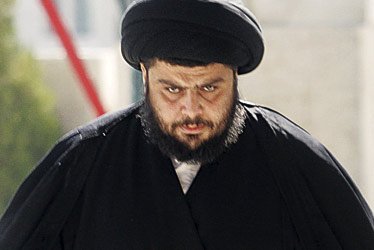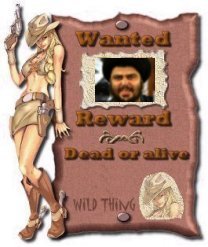
After the fall of Saddam, Muqtada al-Sadr, a charismatic Iraqi cleric who comes from a powerful clerical dynasty, emerged as one of the country’s most talked-about Shi’a leaders.
Al-Sadr is one of the most vocal critics of the U.S. troops being in Iraq.
On 18 July 2003 al-Sadr used a Friday sermon in Al-Najaf to denounce as “puppets” the members of Iraq’s new U.S.-appointed Governing Council. He also announced his own plans to form a militia.
Al-Sadr announced his new government during his sermon at Friday prayers in Al-Kufah on 10 October 2003. Muqtada al-Sadr announced his intention to form an Islamic state in Iraq by establishing a shadow government there, complete with ministries.
Former Iranian President Akbar Hashemi Rafsanjani praised al-Sadr’s recent actions as “heroic” during his Friday prayer sermon in Tehran:
“Contrary to these terrorist groups in Iraq, there are powerful bodies which contribute to the security of that nation…among them is the Mahdi Army, made up of enthusiastic, heroic young people”
By early 2004 Sadr’s followers had elevated him to the rank of hujjat al-Islam (a “Sign of Islam,” or a “Proof of Islam,” the third rank from the top in the Shi’i clerical hierarchy). He wraps himself in a white funeral shroud, showing he is ready for death.
April 7th, 2004……… Iran, Hezbollah support al-Sadr
Muqtada al-Sadr, the fiery Iraqi Shi’ite cleric who ordered his fanatical militia to attack coalition troops, is being supported by Iran and its terror surrogate Hezbollah, according to military sources with access to recent intelligence reports.
On 05 August 2004 Moqtada al-Sadr called on his followers in Iraq to rise up and fight US troops. The message comes as clashes broke out in at least three cities between his supporters and US and Iraqi security forces. Moqtada al-Sadr’s representatives said the truce between his followers and the US military was over. By 06 August the US military estimated it has killed 300 militants in the city of Najaf in two days of fighting. Heavy fighting has also been raging in the streets of Sadr City in Baghdad, where at least 19 people have been killed over the same period. Sadr’s spokesmen sent mixed messages, with one saying al-Sadr wanted to reinstate the truce, and another saying he had declared America the enemy and urged his followers to fight on.
In late June 2005, however, Muqtada al-Sadr called for a nationwide cease-fire and announced that he would join the political process in the following days. The announcement followed discussions between al-Sadr and the Iraqi government as well as coalition officials.
The peace deal lasted until August 5, when Sadr supporters attacked a Najaf police station, setting off intense clashes between Mehdi Army fighters and U.S. forces. Sadr’s supporters used the city’s revered sites, primarily the Imam Ali shrine and its adjacent ancient cemetery, to launch their attacks. Some 3,000 U.S. troops and hundreds of Iraqi security forces were deployed to Najaf to try to crush the uprising.
Sadr spokesman, told Al Jazeera August 30 that Sadr was calling on his forces to stop fighting and wait for an upcoming “political project.” Sadr supporters have said they will field candidates for the January elections and campaign on a platform calling for U.S. forces to withdraw. But many experts are deeply skeptical about Sadr’s intentions, noting that he has promised to stop fighting and join the political process more than once in the past, only to resort to violence.
“He’s said it before, many times,” Katzman says. “He’ll likely keep talking, rearm his militia, and build up support in other cities while staying fairly quiet in Najaf.”
How big is the Mehdi Army?
It’s unclear. Sadr supporters claim it numbers 10,000 men, although some reports place the number far lower, between 1,500 and 3,000. Some experts say there are also hundreds of thousands of additional Iraqis who are “passive” Sadr supporters.
January 23, 2006……Muqtada Pledges Defense of Iran from US attack.
Muqtada al-Sadr, visiting Iran, has pledged the support of his militia, the Mahdi Army, to Iran in case that country were attacked by the United States.
How widespread is Sadr’s support among Shiites?
Experts say he commands the loyalty of some 3 million to 5 million very poor Shiites across the country,
April 6th, 2006……..Muqtada al-Sadr is back with a vengeance. Al-Sadr proved a quick study, devising a new approach to his goal of becoming the leader of Iraq’s Shi’ite community. He developed a social-services network that could provide the average Iraqi with the protection, medicine, supplies, assistance and even money and jobs that they so desperately needed.
He has parlayed this popularity into real political power. His followers won 30 of 275 seats in the 2005 parliamentary elections. It has largely been al-Sadr’s recalcitrance that has produced the months of stalemate in forming a government. He doesn’t yet have the power to choose the country’s leaders, but he does have the clout to block those he doesn’t like, and if Iraq’s low-level civil war continues to build, his power seems only likely to rise with it, riding the wave of Shi’ite frustration that he has nurtured from the very beginning.
October 9th, 2006
American and Iraqi troops fight fierce battle with militants in Diwaniya, stronghold of militia members loyal to radical Shiite cleric Moktada al-Sadr; skirmish is third serious clash between American or Iraqi soldiers against members of Mahdi Army in Diwaniya in less than two months; American officials have increased pressure on Prime Min Nuri Kamal al-Maliki to rein in armed militias like Mahdi Army
October, 12th, 2006
BAGHDAD, Iraq — Gunmen, some of them in police uniforms, stormed the downtown Baghdad headquarters of a new satellite television station Thursday, killing the board chairman and 10 others in the second attack on an Iraqi station in the capital. The attack was carried out by Shiite militiamen.
I wrote about this attack on Sunday, Oct. 21.
Oct. 20 — Hundreds of militiamen linked to the Shiite cleric Moktada al-Sadr battled local police and members of a rival Shiite militia in the southeastern city of Amara today, destroying police stations and seizing control of entire neighborhoods, in apparent retaliation for the arrest of one of their fighters.
BUT look at this………….
Al-Sadr’s considerable leverage was apparent earlier this week, when al-Maliki ordered the release of one of Mr. Sadr’s senior aides. The aide had been arrested a day earlier by American troops on suspicion of participating in kidnappings and killings. sheesh!!!! Our troops had to have been ticked off beyond belief at this happening after the got the jerk and arrested him. SORRY, but WTF???????

Wild Thing’s comment…..
These are only a few of the attacks that this Muqtada al-Sadr and his Mahdi Army have carried out. He is an extremely dangerous man and his truce meant nothing. We knew that, our troops knew that and I think our government and the Iraqi governement knew that too. I pray we come down hard on Muqtada al-Sadr and his army of killers. They do not need to exist one more breath.
Iran may lend some support to any element working to hasten the departure of the Americans from Iraq. Iran, giving them money and weapons and even men to help in the fight. We have read in the past of how Muqtada al-Sadr visited neighbouring Iran since Saddam Hussein was ousted, meeting senior officials in Tehran.
Muqtada al-Sadr visited Iran to attend events commemorating the fourteenth anniversary of Ayatollah Khomeini’s death on June 4 and spent a week meeting with top Iranian officials, including Iran’s supreme leader, Ayatollah Ali Khamenei, and the head of the judiciary, Mahmoud Hashemi Shahroudi He was also reported to have met secretly with Qasim Suleimani, the commander of the Qods Brigade (a special external department within IRGC intelligence
And this freaking al-Maliki is a weak kneeded fanny kissse to whatever al-Sadr wants. If not then why the heck did he let the prisoner go and all the other things he has done.

Remember, the Afghan government had several prisoner releases of Taliban terrorists. This is the strangest part of the world. Has been in turmoil a zillion years. Every time Iraq appears to be settling down to some sort of stability, up pop some another group or a previous group to disrupt things. If they were stabilized they would then show how out of date and incapable they are to join anything beyond the eighth or ninth century.
Someone needs to ventilate this guy. Why we allow these pukes to continually contribute to the Iraqi sewer system is beyond me. Until we make a commitment to kill the disease rather than treating symptoms, we will spin our wheels over there forever. We just have to rediscover our will.
Billy
Well we had him and let him go a couple of years
ago now hes come back to bite us in the ass…
Had him dead to rights a couple of years ago. He was stuck. He said heplay all nice in the sandbox and we believed him. Now look. Bag him in the night, don’t let anyone know, and bury him in the sand.
Tom, I agree and that part of the world really does not seem to want to change. Ratio of so few compared to so many that want to better their lives. Very weird for one thing.
And their hate, I could never live hating every day.
Billy, that is it, we need to discover our will in this. What we feel, must begin to be felt by our leaders and those in charge.
Tincan Sailor, he sure is and he is on a roll right now too.
razOr I like that very much. Yes indeed I do!
All I can say is where is Carlos Hathcock when
we really need him?? Ask any Marine who Carlos
Carlos was and what he did!! God speed Carlos!
Tincan Sailor, I agree, and I sure do know who Carlos Hathcock was.